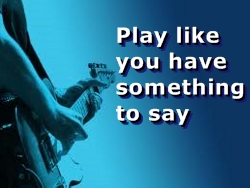 When we look at guitar solos, we might ask how are they built? Are they just a string of licks or phrases? What is being communicated? Is it some kind of musical code or is there a deeper emotional feeling that is being tapped? Does the solo give us insight into how the soloist is feeling? And what can it tell us about their relationship to the underlying song and its message?
When we look at guitar solos, we might ask how are they built? Are they just a string of licks or phrases? What is being communicated? Is it some kind of musical code or is there a deeper emotional feeling that is being tapped? Does the solo give us insight into how the soloist is feeling? And what can it tell us about their relationship to the underlying song and its message?
Students are continually asking me how to craft their solos, and I began addressing that subject in the post http://guitarlessonexpert.com/blog/the-3-main-elements-in-a-great-guitar-solo. However, I observe a lot of them do something that I believe is ultimately destructive when they play their solos. Because they are not yet confident in developing licks and phrases of their own, they begin their process by mimicking the solo licks, riffs, and phrases of the great guitar players of our time. On one level this has great value, because it is helping them to develop a musical vocabulary, and realistically, most of the things we do in life we do from a “monkey see, monkey do” perspective. However, I draw the line when it comes to implementing these exact phrases into their solos.
I went to see a developing music artist and was amazed by what I heard when he soloed. There were a bunch of licks that I recognized note for note from major artists like Jimi Hendrix, Eric Clapton, Alvin Lee, Albert King, and many more. These licks or riffs weren’t changed in any way from the original, no development or expansion, no alteration or elongation. They just played the naked original lick, but what was worse, they strung the licks together, out of context, linking their favorite player’s licks together with no rhyme or reason as to how they connected except for that they were in the same key.
So why would I say that would be an ineffective solo? I want you to imagine going back in time to your high school literature classes. Think about your reading list. Books like Moby Dick, Last of the Mohicans, Catcher in the Rye, Slaughterhouse Five, 1984, Madame Bovary, Wuthering Heights, War and Peace, and whatever else was on your list. Now I want you to imagine taking a sentence from each one of those masterpieces and stringing them together, one after another until you’ve create a paragraph or two. So, what do you think? Pretty incoherent, isn’t it. The entire internal context that caused each of the writers to choose those exact words is lost. The stylistic aspect of their writing that felt uniform in their own paragraphs feels disjointed in this imaginary one. Nothing follows anything else, or sets it up for that matter. These classic words become just a group of isolated phrases that have no meaning.
That’s exactly what happens when you pull a phrase out of a great soloist’s work and attempt to force it together with an entirely different phrase type and style. It just doesn’t work, and it doesn’t do anything to advance the song you’re playing.
So take that vocabulary that you are starting to build by listening to great soloists, and begin to massage it. Play it inside out; turn upturns into downturns, and vice versa. Play the phrases with your own sense of style and altered rhythm. In short, make the phrases belong to you and let them express your voice. And finally, tell your story. Play like you have something to say.
